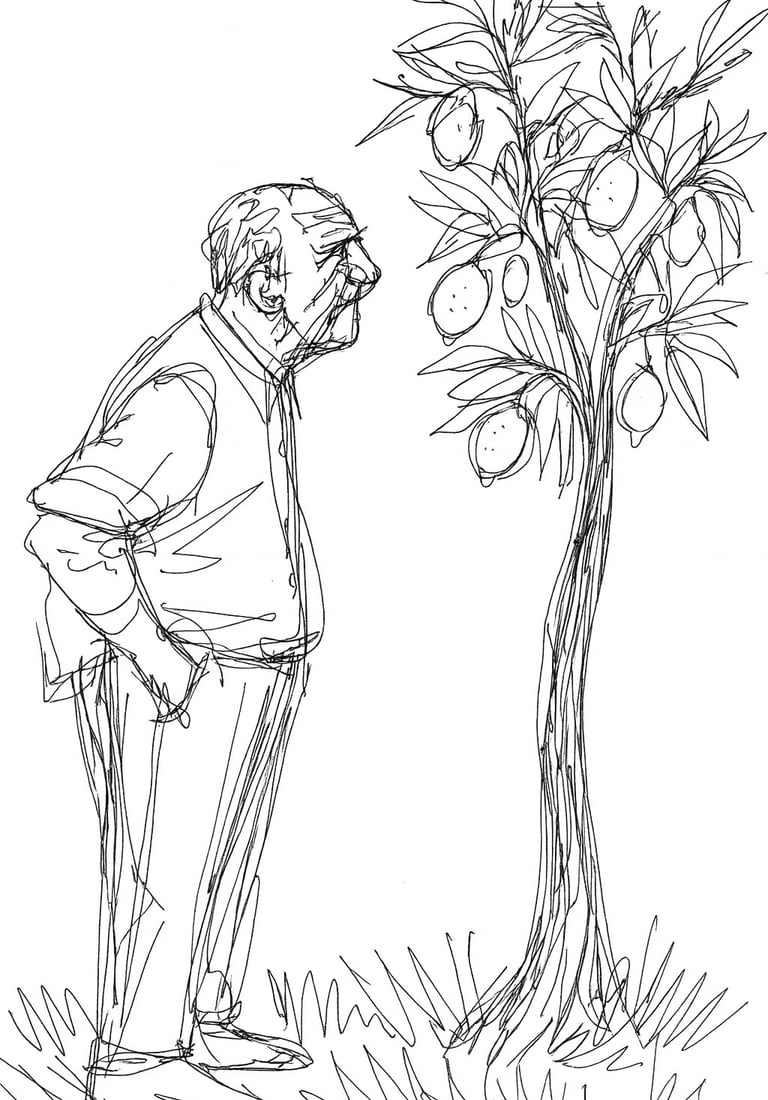Onde Deus não dorme
FLASH FICTION
Cirilo Lemos
6/26/20253 min read


O velho Severino acordava todo dia antes da luz, sem precisar de despertador. A casa, há anos vazia de vozes, era visitada apenas pelo barulho do vento arranhando as telhas e pelo ranger da cadeira de palhinha que insistia em balançar sozinha na varanda.
A vizinhança dizia que ele falava com Deus. Que passava horas no quintal murmurando para os galhos secos do pé de limão, onde ninguém mais via fruto, mas ele jurava ainda ver um limão nascendo, pequeno, verde e com cheiro de promessa.
“Deus tá ali”, dizia, apontando para o galho retorcido. “Só não quer aparecer pra ninguém mais.”
Nos domingos, ia à igreja, sentava-se no mesmo banco do canto, mas não abria a boca. Apenas observava o altar como quem espreita uma porta trancada por dentro. Nunca comungava. Quando o padre oferecia o corpo de Cristo, Severino abaixava a cabeça. “Ele não tá aqui hoje”, cochichava.
As crianças tinham medo dele. Achavam que ele era um santo invertido, desses que não fazem milagre, só esperam. Às vezes perguntavam à mãe se podiam jogar pedras no muro de Severino, só pra ver se ele reagia. Mas Severino nunca reagia. No máximo, sorria. Um sorriso gasto, como página de Bíblia esquecida no sol.
Um dia, o limoeiro caiu. Foi de madrugada, durante um vento sem nome. Pela manhã, encontraram Severino sentado ao lado do tronco derrubado, olhos abertos, fixos no céu. Mãos postas. Sorriso nenhum.
No bolso da camisa havia uma carta escrita em papel de pão: "Se Ele estava no galho, caiu junto. Se estava em mim, esvaziou. Esperei por Deus como se espera por chuva em cemitério: só por amor ao gesto."
Na igreja, fizeram missa. Disseram que Severino foi um homem de fé. Que via Deus em tudo. Mas ninguém comentou que talvez o que ele via fosse só o rastro do que faltava.
E o banco do canto ficou vazio.
Ainda hoje, de vez em quando, a cadeira de palhinha range sozinha. Mas ninguém mais presta atenção.
***
Where God Doesn't Sleep
Old Severino woke up every day before the light, no alarm clock needed. The house, empty of voices for years, was visited only by the wind scratching the roof tiles and the creak of the wicker chair that insisted on rocking by itself on the porch.
The neighbors said he talked to God. That he spent hours in the backyard whispering to the dry branches of the lemon tree, where no one else saw fruit anymore—but he swore he could still see one growing: small, green, and smelling of promise.
“God’s right there,” he’d say, pointing to the twisted branch. “He just doesn’t want to show himself to anyone else.”
On Sundays, he went to church and sat on the same bench in the corner, but never opened his mouth. Just stared at the altar like someone watching a door locked from the inside. He never took communion. When the priest offered the body of Christ, Severino would bow his head. “He’s not here today,” he’d whisper.
The children were afraid of him. They thought he was some kind of upside-down saint, the kind that doesn’t work miracles—just waits. Sometimes they asked their mothers if they could throw rocks at Severino’s wall, just to see if he’d react. But Severino never did. At most, he’d smile. A worn-out smile, like a Bible page forgotten in the sun.
One day, the lemon tree fell. It happened at dawn, during a nameless wind. By morning, they found Severino sitting next to the fallen trunk, eyes open, fixed on the sky. Hands clasped. No smile.
In the pocket of his shirt was a note, scribbled on bread paper:
“If He was in the branch, He fell with it. If He was in me, He emptied out. I waited for God the way you wait for rain in a cemetery: only for love of the gesture.”
At church, they held a mass. Said Severino had been a man of faith. That he saw God in everything. But no one mentioned that maybe what he saw was just the outline of what was missing.
And the corner bench stayed empty.
Even now, from time to time, the wicker chair creaks on its own.
But no one pays it any mind anymore.